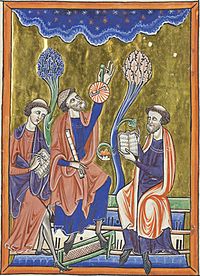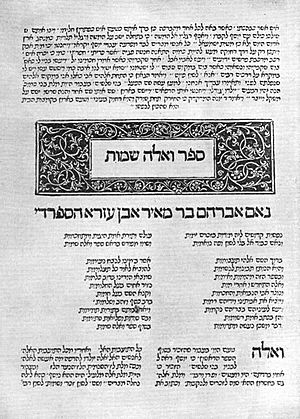Abraham ibn Ezra facts for kids
Quick facts for kids
Abraham ibn Ezra
ראב"ע |
|
|---|---|

An illustration of Ibn Ezra (center) making use of an astrolabe.
|
|
| Born | c. 1089 - 1092 Tudela, Taifa of Zaragoza
|
| Died | c. 1164 - 1167 |
| Known for | writing commentaries, grammarian |
| Children | Isaac ben Ezra |
Abraham ben Meir Ibn Ezra (Hebrew: ר׳ אַבְרָהָם בֶּן מֵאִיר אִבְּן עֶזְרָא ʾAḇrāhām ben Mēʾīr ʾībən ʾĒzrāʾ), often called Ibn Ezra, was a very important Jewish writer and thinker during the Middle Ages. He was born around 1089-1092 in Tudela, which is now part of Navarre, Spain. He is remembered for his writings about the Bible and his ideas on many subjects.
Contents
Who Was Abraham ibn Ezra?
Abraham Ibn Ezra was born in Tudela, a town in Spain with a long history of Jewish communities. At that time, the town was ruled by Muslim leaders. Later, he moved to Córdoba, though most experts agree he was born in Tudela.
Ibn Ezra had a wife and five children. Sadly, four of his children are believed to have died young. His last child, Isaac, became a well-known poet. Isaac later chose to become a Muslim in 1140, which was very upsetting for Ibn Ezra. He wrote many poems about this event for years.
Ibn Ezra was a close friend of Judah Halevi, another famous Jewish scholar. They traveled together for a while, starting in 1137. After Halevi died in 1141, Ibn Ezra continued his travels for about 30 more years. He journeyed to many places, even as far as Baghdad. During his travels, he wrote poems about the places he saw. He also started writing his famous commentaries, which are explanations of the Bible.
What Did He Write?
In Spain, Ibn Ezra was already known as a talented poet and thinker. However, most of his important works were written after 1140. He wrote in Hebrew, which was different from earlier thinkers who often used Judeo-Arabic. His writings covered Hebrew grammar, ways to understand the Bible, and scientific ideas. He often included knowledge he had learned from Arab scholars in Spain.
While in Italy, Ibn Ezra worked hard to translate books by Judah ben David Hayyuj, who was an expert in Hebrew grammar and explaining the Bible. He translated Hayyuj's works from Judeo-Arabic into Hebrew. These translations, published around 1140, were some of the first books on Hebrew grammar written in Hebrew.
Around the same time, Ibn Ezra began writing his own explanations of the Bible. He used many of the methods he learned from Hayyuj. His first Bible explanation was for the book of Kohelet in 1140. He continued writing these explanations for other books of the Bible during his travels. In 1145, while living in Lucca, he wrote a short explanation for the entire Pentateuch (the first five books of the Bible). He later expanded this into a longer explanation, starting with the book of Genesis in 1155.
Besides his Bible explanations, Ibn Ezra also wrote many books about science in Hebrew. He wanted to share the knowledge he had gained in Spain with Jewish people in other places. For example, when he lived in France, he published many works about astrology (the study of how stars and planets might affect life) and how to use an astrolabe (an old tool used to measure the positions of stars and planets).
His Impact on Understanding the Bible
Ibn Ezra liked to stick to the plain meaning of the Bible texts. He didn't use many hidden meanings or mystical ideas. Some people say he had a very logical way of thinking.
He is seen by some as one of the first people to question who wrote parts of the Torah. For example, Baruch Spinoza, a later philosopher, pointed to Ibn Ezra's comments on Deuteronomy. Ibn Ezra noticed that a verse in Deuteronomy (1:1) talks about Moses being "beyond the Jordan River." This seemed odd because Moses and the Israelites hadn't crossed the Jordan yet in the story. Ibn Ezra hinted that "the truth" about this might be different. Spinoza and others later used these hints to suggest that Moses might not have written the entire Torah himself, but that someone else wrote or edited parts of it much later.
However, other scholars believe that Ibn Ezra's writings can still fit with the traditional Jewish belief that Moses received the Torah directly from God.
Ibn Ezra was also one of the first scholars to suggest that the Book of Isaiah might have been written by at least two different people. He noted that chapters 1-39 seemed to be about a different time period than chapters 40-66. Today, most scholars agree that the Book of Isaiah has these two main parts.
Ibn Ezra's writings, especially his longer discussions, also included many ideas about the philosophy of religion. He wrote a special book called Yesod Mora ("Foundation of Awe") in 1158 for a friend in London. This book explained the reasons behind the Bible's commandments. His philosophical ideas often included Neoplatonic thoughts, and he believed astrology played a role in the world. He also wrote many books on math and astronomy.
Lasting Legacy
A crater on the Moon was named "Abenezra" to honor him.
The famous poem "Rabbi Ben Ezra" by Robert Browning, which starts "Grow old along with me/The best is yet to be," was inspired by Ibn Ezra's life and work.
See Also
 In Spanish: Abraham ben Meir ibn Ezra para niños
In Spanish: Abraham ben Meir ibn Ezra para niños
- Rabbinic literature
- List of rabbis
- Jewish views of astrology
- Jewish commentaries on the Bible
- Kabbalistic astrology
- Astrology in Judaism
- Hebrew astronomy
- Islamic astrology
- Abenezra (crater)
 | Victor J. Glover |
 | Yvonne Cagle |
 | Jeanette Epps |
 | Bernard A. Harris Jr. |


